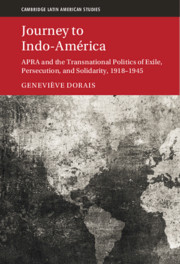Refine search
Actions for selected content:
3 results
3 - “Lo que escribo lo he visto con mis propios ojos”: Travels and Foreign Contacts as Regime of Authority, 1928–1931
-
- Book:
- Journey to Indo-América
- Published online:
- 30 July 2021
- Print publication:
- 12 August 2021, pp 84-122
-
- Chapter
-
- You have access
- Open access
- HTML
- Export citation
Introduction
-
- Book:
- Journey to Indo-América
- Published online:
- 30 July 2021
- Print publication:
- 12 August 2021, pp 1-25
-
- Chapter
-
- You have access
- Open access
- HTML
- Export citation

Journey to Indo-América
- APRA and the Transnational Politics of Exile, Persecution, and Solidarity, 1918–1945
-
- Published online:
- 30 July 2021
- Print publication:
- 12 August 2021
-
- Book
-
- You have access
- Open access
- Export citation
